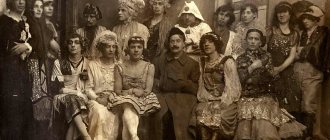Life in the zone is clearly regulated by the so-called “laws of the criminal world,” the priority of which is much higher than that of the regulations of the correctional institution and the criminal legislation itself. Such laws are called “concepts” in prison.
According to the “concepts”, a hierarchy of prisoners is built, according to which each of them takes his place in one or another prison caste, which is usually called “suits”. Some castes occupy a privileged position, while in relation to representatives of others they adhere to neutrality. However, there are “suits” whose members are doomed to disdain and humiliation from other prisoners.
Experts note that recently prison rules have changed significantly in comparison with those that were in force during the Soviet era. Who fell out of favor in Soviet prisons and what was the reason for this attitude? But before answering this question, let’s consider the so-called types of zones.
The place of “goats” in the prison hierarchy
The so-called “goats” occupy the third level of the prison hierarchy after the “thieves” and “men.” The former are privileged prisoners, and the latter are people who accidentally stumbled, striving to return to normal life after serving their sentence.
Unlike the first two castes, the “goats” establish mutually beneficial relationships with the administration, for which they are not loved in the “black zones”. Due to hostility from other prisoners, they are often allocated separate barracks. In zones strictly controlled by their administration, “goats” can even occupy a high position and set rules for other representatives of the prison world.
A rather serious insult is the use of the word “goat” or its derivative in relation to a prisoner who does not belong to this caste.
“Reds”, aka “goats”
This was the commonly used name for prisoners who collaborated with the camp leadership, received encouragement from the guards and a public (or secret) right to disciplinary action on all other categories of inmates. The “goats” included everyone who received any administrative or bonus position in the camp - these were people who could have access to food in the kitchen or, for example, to the distribution of clothing. Even if the occupation did not involve the opportunity to snatch something, but freed one from heavy general work, the person in this job was considered a “goat.”
There were also various disciplinary and “educational” detachments from among the prisoners in the camps - these were the “reds” in the classical sense. They reported to the guards about various violations of discipline and in general about the affairs of prisoners; they could indulge in physical abuse or help ensure that someone was punished according to the camp rules.
Of course, the so-called “goats” were not respected, and for any other prisoner being considered a “goat” was considered a grave insult. But these people still had power - they were feared and were not accepted in the community of “thieves” or “men” as one of their own, since the camp leadership itself stood behind them.
Although during the period of the “bitch wars” (the last decades of the Gulag’s existence), many “thieves” defected to the “Reds” (some ideologically, some simply for reasons of security or profit).
What are “wool” and “garbage”
It is customary to call former law enforcement custodians who are serving a sentence for any offense as trash. Starting a conversation with such a prisoner or simply touching him can make the initiator an outcast. Killing "garbage" is considered a great "honor".
“Wool” is the name given to those who collaborate with the administration and initiate lawlessness without being a representative of the “highest” caste. Such “activists” received wool blend uniforms in Stalin’s camps, which is where the name came from.
Prison castes in the countries of the former USSR have their own specifics
The population of Russian pre-trial detention centers, prisons and camps is heterogeneous: it is divided into peculiar castes, called “suits” among prisoners.
Prisoners of different stripes
This category of prisoners does not enjoy much respect in the prison environment. Currently, the following approach is common among prisoners: they are called a goat or a bitch (these concepts are almost identical) for their actions, but not for their position, that is, a convicted person can formally hold any position (up to the commandant), but not be considered a goat, bitch Below the men on the hierarchical ladder are shnyrs (sixes), that is, those who voluntarily begin to serve other prisoners for some benefits.
Caste of "lowered" ("roosters")
This caste is the lowest in the hierarchy in the zone, and its representatives are passive homosexuals. Anyone who has at least once been sexually assaulted by another prisoner, or has come into contact with one of the “omitted” ones, becomes a “Rooster”. All the menial work goes to the “low-down” ones. They pick up trash and clean toilets. Any touching of them is prohibited (except sexual contact).
The strongest insult in the zone is any hint that the prisoner belongs to the caste of the “lowered”. If there is no immediate reaction, the offended person may be considered a “rooster.”
Anyone can have sexual intercourse with the “destroyed” one, however, in order to avoid suspicions that the intercourse took place “for love”, he is offered payment for the “services” provided, for example, food or cigarettes.
When did lower castes appear in the criminal environment?
There are several points of view on the appearance of neglected people in the criminal environment. The most common of them indicates that the lower caste arose in the 30-40s of the last century. At that time, juvenile offenders who were placed in general cells from the age of 12 could be forced into homosexual relations.
There is another opinion, according to which the omitted appeared in Russian prisons in the 40-50s of the last century. At that time, recidivist criminals did everything possible to maintain a dominant position in prisons. To do this, they actively resorted to beatings and murders. Sometimes it even came to sodomy. In this way they humiliated the most rebellious prisoners.
Having survived such bullying, some prisoners “broke”, becoming passive homosexuals and pleasing thieves. For their services they received food and various privileges.
"Omitted"
This is definitely the lowest caste. Common names for such people were also “blues” or “roosters.”
Among those “omitted” were people of non-traditional sexual orientation (and in the legislation of that time there was a criminal article for this). Also, former police officers, representatives of government agencies and similar workers were often “released” into the camps themselves. But it also happened that among those “left out” there were other people: for example, informers (informers), or those who did not pay off a gambling debt, or simply weak-willed, “broken” people.
Still from the film "Mayhem"
The “roosters” were assigned the worst and dirtiest types of work; they were allocated only the worst places in common cells. No one was supposed to touch their personal belongings (usually the set of these items was limited to clothes and metal utensils); for this purpose, marks were even made on the items - a bowl and spoon were sometimes marked with holes. The “lowered” ones themselves were also not touched, they were not spoken to (only commands and demands were voiced), and a person noticed in the slightest contact with the “rooster” or his things became “rinsed” - not yet “lowered”, but as if under suspicion.
There was, of course, the practice of homosexual violent relationships with “roosters”: the “low-down” had to serve the “thieves” and sometimes “goats”. Between “men” and “roosters” such a practice was rare. This was considered intra-camp prostitution - for each such act, the prostitute was given a meager reward.
During some periods of the existence of the Gulag or in individual camps, additional castes of prisoners sometimes arose. For example, during the Second World War and in the post-war years, the camps were filled with “warriors”—deserters from the front, suspected of collaborating with the enemy.
Zones "black" and "red"
Before talking about prison castes, it is worth noting that zones also have their own divisions. There are “red” zones - these are those where the administration strictly controls all aspects of life, and ensures that all prisoners, without exception, obey all internal rules. “Black zones,” and the majority of them in the country, live “according to concepts,” here the administration is forced to share power with criminals, and turn a blind eye to the fact that relationships between prisoners and internal life are built “according to concepts.”
Prison castes
Roosters
The last caste is COOSTERS, they are also “offended”, “lowered”, “faggots” and so on. This is a caste of outcasts, untouchables, outcasts, among them there are also passive homosexuals. At the same level in the zone there is an intermediate caste - “chushki”, “devils”. The only difference is that they are not used as passive pederasts - they are simply untouchables.
Homosexuality has always existed in prisons; it was, as a rule, voluntary. But over time—according to some information, since the reform of the “corrective labor” system in 1961—a custom began to spread in the zones: punishment in the form of forcibly converting the perpetrator into a pederast. Some Gulag veterans believe that this custom was invented by the opera - it became their weapon in the fight against the deniers. There is a similar custom among some backward tribes in Africa - there boys who fail the test of initiation into men are given female names, dressed in women's clothing and resettled to the outskirts of the camp. That is, they are made as if they were not men. A similar thing occurs in some species of monkeys - the leader of the pack, as a sign of victory over the offending male, rapes him.
In the right concepts, there is a law: “x...m is not punished.” That is, prison law directly prohibits punishing anyone in this way. If a person is found guilty - and guilty only of prison life, and not of freedom - he can be fined - a pack of Belomor, a million rubles, etc. If they decide to do so at the showdown, he can be beaten, his bones broken, and finally killed. But you can't put it down.
I have already said that the omitted appeared in the prison community after the 1961 reform. Before this reform, there was one type of camp for all prisoners. The reform divided the camps into regimes: general, reinforced, strict, special. As a result, the pioneers, who began to be imprisoned in general regime camps, were separated from the repeat offenders. They found themselves in other modes so as not to “have a bad influence” on the pioneers. The pioneers were thereby separated from the experience of forced living together, developed over many generations, which the recidivists, among other things, possessed. This experience allowed (we are talking about the second half of the fifties) to at least live in peace. In the previous camps there were also people of all ages. And the struggle for supremacy there was to some extent mitigated by the existence of a large number of elderly and old people. Of course, they might not be afraid or respected, but still there are things that people do not do or try not to do in the presence of their elders - this is in every person. Now imagine: hordes of young men (and the pioneers, as a rule, are people of the same age, 20-22 years old), whom nature itself doomed to constant competition and finding out who is more important, stronger, smarter. Naturally, there will always be bickering between them, since they cannot at least separate for a while, rest, communicate with those with whom it makes no sense to compete - with old people, women, children. By the way, things are even worse in the minors precisely because there are no elders there. Even the prison administration understands this and places “father”—an adult prisoner—in the cells of young children. And these “fathers” sometimes rob young children, which is why the position of “father” is considered a bad one.
Most people are imprisoned in areas for minors, that is, where they do not know the prison law, albeit terrible and cruel, but the only one under which people can remain human and simply survive. After juvenile detention, prisons produce the most children. For the same reason that registration is arranged - they believe that this is how it is supposed to be. In camps people are released much less frequently than in prisons. The stricter the regime, the less often. In general, the more difficult the regime in the camp, the easier it is for those who are in it.
They say it's better to die than to become a "rooster." They treat them very cruelly: they force them to live in trees, eat mice, they shove light bulbs up their asses - whoever cares. But this, again, depends on the regime. The wildest things happen to them in general mode, not to mention when they are young. It’s easier for them on strict. Every prisoner there knows his place. Usually in a strict regime, and indeed in any correct zone, a rooster is simply a rejected person. Everything is separate to him, and he doesn’t dare touch anyone. But if he was offended, if he was treated unfairly, he can complain to the authorities, and they will protect him, because experienced people understand: those who are muzzled by their own people will go to seek protection from strangers. That is, he will work for the administration, knock.
The roosters have separate places, separate dishes, separate work - a parade ground for revenge, washing toilets. You can't take anything from them. But you can give it, throw it so as not to accidentally touch it. Although there are exceptions here. When they are “used”, this is not considered defiling contact. In a punishment cell, sometimes you can only convey something through a rooster - if between the punishment cell and the residential area there is a “ban,” a forbidden zone. Only the one who levels it can be on it, that is, the roosters - this is their job. It is through them that the heat is transmitted. It is believed that in such a situation, neither the things that passed through the hands of the rooster, nor the one who received them, are “grinded”, that is, they are not desecrated.
In prison conditions, in special and maximum security colonies, there are usually few roosters - from one to five percent. In the intensive and general regime, their share can reach 10-12%, and in the minor – up to 20. The softer the regime, the more there are. In some zones there are entire barracks of them - “monkey houses”, “offenders”. And in normal zones they simply sleep at the entrance to the barracks and do not go further. Roosters usually have their own “godfather” - the chief rooster. This is an influential figure. After all, he can order some rooster to kiss, say, someone in front of everyone. The rooster, of course, can be killed for this, but the one he kisses automatically becomes a rooster himself. The chief petukh is at the same time an intermediary between the untouchable caste and the entire camp community. All claims of those who have been omitted, all their proposals are conveyed to the authorities (gangway) through this leader. Through him, this group of outcasts and people formally removed from normal life is controlled by those in authority. The head rooster is an optional figure; sometimes there are two leaders (“folder” and “mother”) or even more. It should be noted that the leaders of the roosters are people who are very informed about the internal life of the zone. They know many intrigues, they can know who the real “overseer” is (often the prisoner who appears to be the “overseer” is a dummy figure, and the real leader of the zone is not revealed), and much more.
Roosters become roosters for life. If a rooster comes to a zone where no one knows him - when he is transferred there, or from outside if he is imprisoned a second time - he is obliged to inform the lads about his status. There is no use in hiding this; sooner or later the rooster's past becomes known, and then the exposed roosters are punished, beaten, and often killed. After all, it is believed that such a rooster “grinded” all those who considered him an equal.
Since the beginning of the 90s, since prison morals began to rapidly spread in the wild, those who had been deported began to come from there, with a ready-made status.
By the way, among those left out there are not so many passive homosexuals and “prostitutes”, contrary to popular belief. Basically, as I have already said, they end up in prison for gross violations of prison law, for example, for snitching, for ratting (theft from one’s own), for lawlessness, for non-payment of a gambling debt. Those who themselves lowered or were the plowman of the cell in which someone was lowered without guilt are also very likely candidates for roosters. However, they can lower you for anything. They can let you down for having beautiful eyes. It’s difficult to rape an adult man - he will resist. Therefore, there are a number of replacement rituals. For example, they touch the lips of a sleeping person h...m. Or they soak a towel with sperm and rub it over the face. Sometimes they deceive first movers: let me fuck you and you’ll get a pack of cigarettes. There are some smokers who can live without water and bread, but cannot live without smoking. So they sell them for smokes, or they just pick up bulls from the ground - they make a mess of themselves.
For “services” they can promise support, protection, whatever. This is called “talking the fuck out.” Such deception is considered a major mistake: the deceivers themselves are then put down on a par with rapists and thugs. They can - and this is also the biggest problem - to frame an inexperienced novice prisoner who has taken a fancy to someone. Let's say they occupy all the chairs in the hairdresser except for one, which is scattered. A man, not sensing trouble, enters the hairdresser and sits on the only free chair. “Countryman, where are you sitting?!” - What is it? - Yes, this is a place for fags! - But I didn’t know... - Well, you never know!
Card debtors often end up lost. Those who fail to pay off a debt (even if only in the form of a cigarette) in the zone can simply be killed - this is not a will, they seriously punish for debts there. And so, in order to avoid punishment, a person voluntarily becomes a rooster. At night he takes his mattress and moves to the rooster's perch. Now, like any rooster, you can’t take anything from him.
— If a prisoner’s last name is Petukhov, for example, does this affect his position in the zone?
— The surname itself has no effect. Now, if others don’t like a person for some reason, it will ruin his life.
“I’ve heard that those who are rejected usually include unscrupulous people or those suffering from skin diseases.”
- Lies. Or a typical sample and “research by Fan Fanych”. Prison law seen through a peephole.
Skin diseases cannot be the cause of “sinking”. Of course, the leper himself will sleep separately and drink from his own mug so as not to infect the lads. But there will be no rejection from the lads - he is a full member.
As for the unscrupulous, this is a consequence, not a cause. It is very difficult for a rooster to maintain personal hygiene; he cannot use a common washbasin. And he does the dirtiest work. Uncleanliness is also a violation of prison law. But a person is unlikely to be released for this alone. After all, this happens all the time - where there is an unclean body, there are unclean thoughts and deeds, or simply disrespect for others. Well, where there is dirt, there are skin diseases - this is natural.
To finish with castes, we need to mention a few more groups. In addition to “chushkov” and “devils”, there are also “sixes” in the zones - servants. Sixes include people who are too weak or helpful. Both in prisons and in camps, excessive helpfulness is not honored. If you are asked to do something, say, wash someone else’s socks, and you agree, you’ll be a six. Even if you do it for a fee. In prison, it is customary to look after yourself. Anyone who cannot endure difficulties, who starts doing and doing everything for a piece of bread, does not deserve respect. But, you understand, this does not mean that you should not fulfill any requests at all. It all depends on the situation in which the request is fulfilled, and on who and how it is fulfilled. Sometimes even the person who served the mug of water becomes a six.
Other passive homosexuals differ from roosters - the personal lovers of thieves, all these Jackdaws, Svetkas, Mashki. They don’t beat them, they don’t keep them in a black body, on the contrary, they excuse them from work - so that they are soft. But they are also not allowed to do too much. It is better not to mess with these individuals.
The “sniffs” stay apart in the zones - orderlies in detachments, cleaners in headquarters, canteens, medical units, etc. This is also a public with little respect, something like goats of the last sort.
“They say that in prisons and camps they don’t particularly favor those who are imprisoned for rape.” What other articles, besides 131 of the Criminal Code of the Russian Federation (rape), are considered shameful? If I was imprisoned for some of the “dirty” articles, is there any point in hiding it?
— In general, people in the zone are already accustomed to “rape.” There are worse articles. For example, for evading treatment of sexually transmitted diseases. Also for homosexuality, for indecent acts against minors.
As for rape, the attitude towards those imprisoned under this article is not always the same. It happens, after all, that there was no rape - they just wanted to imprison a person and imprisoned him, albeit under an article for rape (in the old Criminal Code this was the famous 117th, “youth” article). This is a fairly common case.
Previously, articles for vagrancy, hooliganism, and living without registration were also considered unprestigious. In general, respect in the criminal world is enjoyed by those who do their “work” without corpses, without violence, and so on.
I don't know if I should hide my article. Usually such things become known over time.
"Guys"
Numerically, this category always surpassed all others, since it was the main “gray mass” of the contingent in camps and prisons. By the way, that’s what they were called – “grays”. These are people who were mostly convicted of single, often very insignificant, crimes: petty theft, domestic fights, etc.
And given the specifics of the Stalinist judicial system and the practice of convicting people on “political” charges, the “men” category included representatives of the intelligentsia, people with “wrong” biographies, and many others. etc. That is, this definition did not characterize the social layer from which these people came (common people), as their name might suggest, but the function and social role that they received in the camp.
The men went to all types of work, they were not entitled to special privileges. If one of them ended up in a more advantageous position in the camp (for example, a kitchen worker or a librarian), he might no longer be considered a “man”, but considered a “red”.







